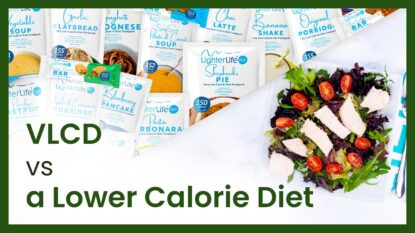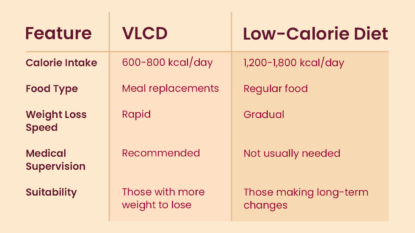Very Low Calorie Diet (VLCD) vs. : What’s the Difference?
When looking to lose weight, you will undoubtedly have spent time researching different diets and likely have found yourself faced with lots of options ranging from the specialised VLCDs right through to the bog-standard ‘cut back a bit’ lower calorie diets. Whilst both these are designed to help you shed the pounds, they work in very different ways and will suit different lifestyles with different degrees of success. So, if you’re wondering which approach is right for you, let’s break it down in simple terms.
What is a VLCD?
A VLCD (Very Low Calorie Diet) is exactly what it sounds like—a diet with a very low daily calorie intake, typically between 600-800 calories per day. However, unlike many other weight loss plans, a VLCD is very structured, and involves the use of specially formulated meal replacement Foodpacks in place of all conventional food. This helps ensure that you get all the essential nutrients you need to keep you healthy and lose weight safely and comfortably, whilst keeping the calories very low. VLCDs were originally designed for people with a significant amount of weight to lose although more recently, published data has demonstrated positive outcomes in individuals with smaller amounts of weight to lose.
If you want to learn more about VLCDs, you can check out this guide on what is a VLCD diet plan.
How is a Lower Calorie Diet Different?
A lower calorie diet on the other hand is quite different. This type of diet can mean anything really and positions itself as being varied so as to suit individual tastes. It generally allows for around 1,200-1,800 calories per day, depending on individual needs and instead of using specially formulated meal replacement products, regular foods are consumed to suits tastes but must be done so in controlled portions, and with the intake of specific foods drastically reduced or stopped entirely. Whilst this approach may suit those who think it will be easier to make gradual changes to their eating habits while still enjoying a variety of meals, the research generally shows that during weight loss, restricting the number of food items available for consumptions can lead to greater weight loss success overall, even in those who simply have a few pounds to lose.
Which One is Right for You?
The choice between a VLCD and a lower calorie conventional food-based diet depends on your health status, goals, lifestyle, and how much weight you want to lose.
- A VLCD will be better if you’re looking for a structured approach with faster results, particularly if you have a lot of weight to lose.
- A lower calorie conventional food diet might be preferable if you have only a little to lose, are contra-indicated from a VLCD for various clinical reasons, or simply prefer a food-based approach without using meal replacements.
The Benefits of a VLCD
A VLCD offers more than just rapid weight loss. Since it’s structured, and nutritionally complete, there is no need to count calories or plan meals, which removes any major decision making processes and makes it easier to stick to. Accompanied by behaviour change support, it can help you better understand your relationship with food and the ‘why’ behind your reasons for overeating, as well as help you address the behaviours which have led to weight gain. In essence, it can help reset your relationship with food. Many people find the simplicity refreshing—no endless meal prepping, or avoiding certain aisles in the supermarket because of your ‘diet’— it’s just a straightforward plan to follow.
The Benefits of a Lower Calorie Diet
This type of food based diet allows you some flexibility in your food choices which means you can partake in the same meals with family and friends while still working towards your goals over a longer period.
Common Misconceptions
- VLCDs are unsafe – When followed correctly, under guidance, VLCDs provide all the necessary nutrients and are a safe, effective way to lose weight.
- VLCDs are expensive – people often find they spend less money overall each week as they are following a tightly boundaried, prescriptive meal plan.
“I’d often considered LighterLife but I felt I couldn’t justify the cost, In fact, this was counterintuitive because when I added up the cost of my weekly shop, and the snacks. LighterLife probably only cost me half of what I actually spent before”. LighterLife client, Sharon.
Final Thoughts
Both VLCDs and lower calorie food based diets can help you lose weight, but they suit diverse needs. If you’re looking for a clear plan with rapid results, a VLCD might be a good option. If you have only a little to lose, or prefer more flexibility and are not bothered about slow weight loss, a lower calorie diet may be the way to go. The most important thing is finding a plan that works for you and fits into your lifestyle.
Whichever path you choose, remember that weight loss is about more than just numbers on a scale—it’s about feeling healthier, more confident, and more in control of your choices. And that’s what really matters.



